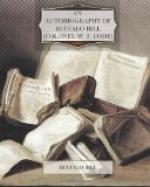My new-found friends did not do things by halves. In order to be able to give a ball in the cabin they exchanged their steerage tickets for first-class passage. That night the ball was given, with my wife and myself as the guests of honor.
The Independence crowd, observing the preparations for the ball, demanded that the captain stop at the first town and let them off. They saw that the tide had turned, and were apprehensive of reprisals. The captain told them that if they should behave like ladies and gentlemen all would be well.
That night they stood outside looking in while my wife, now quite reassured, was introduced to the ladies and gentlemen from Indiana, and danced till she was weary.
We looked for trouble when we reached Independence the next day. There was a bigger crowd than usual on the levee, but when it was seen that my Yankee friends had their Spencer carbines with them all was quiet. As we pulled out the old captain called me outside.
“Cody, it is all over now,” he said. “But don’t you think you were the only restless man on board. When I backed out into the river the other night I had to leave four of my best deckhands either dead or wounded on the bank. I will never forget the way you walked out through the crowd with that pair of guns in your hand. I have heard of the execution these weapons can do when they get in action.”
When we stopped at Kansas City I telegraphed to Leavenworth that we were coming. As the boat approached the Leavenworth levee my soldier friends were out on deck in their dress uniforms, and I stood on the deck, my bride on my arm. Soon we heard the music of the Fort Leavenworth band and the town band, and crowds of citizens were on the wharf as the boat tied up.
The commandant of the fort, D.R. Anthony, the Mayor of Leavenworth, my sisters, and hundreds of my friends came rushing aboard the boat to greet us. That night we were given a big banquet to which my soldier chums and their wives were invited. My wife had a glorious time. After it was all over, she put her arms about my neck and cried:
“Willy, I don’t believe you are an outlaw at all!”
I had reluctantly promised my wife that I would abandon the Plains. It was necessary to make a living, so I rented a hotel in Salt Creek Valley, the same hotel my mother had formerly conducted, and set up as a landlord.
It was a typical frontier hotel, patronized by people going to and from the Plains, and it took considerable tact and diplomacy to conduct it successfully. I called the place “The Golden-Rule House,” and tried to conduct it on that principle. I seemed to have the qualifications necessary, but for a man who had lived my kind of life it proved a tame employment. I found myself sighing once more for the freedom of the Plains. Incidentally I felt sure I could make money as a plainsman, and, now that I had a wife to support, money had become a very important consideration.




